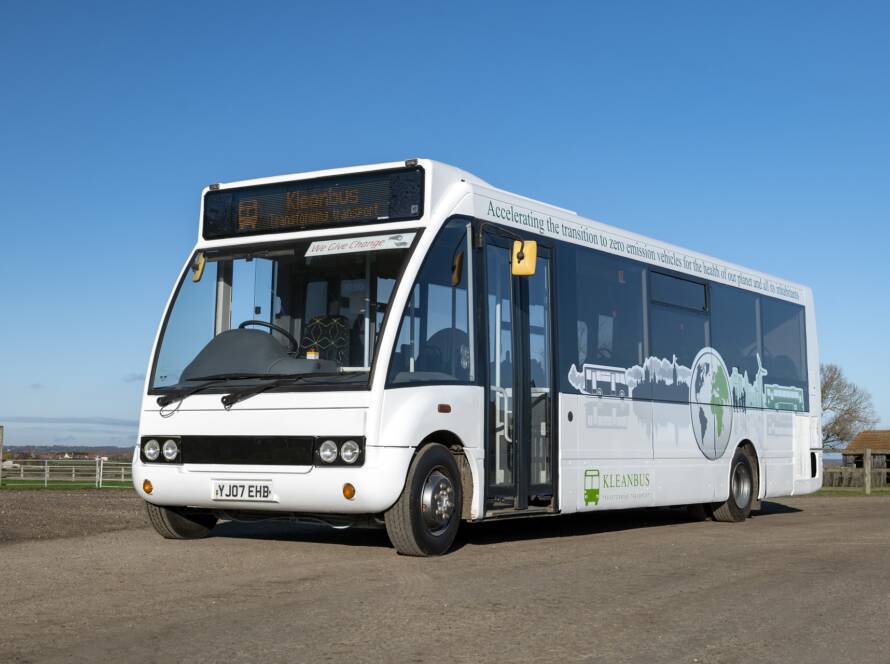KleanDrive: Pioneering the Electric Retrofit Revolution
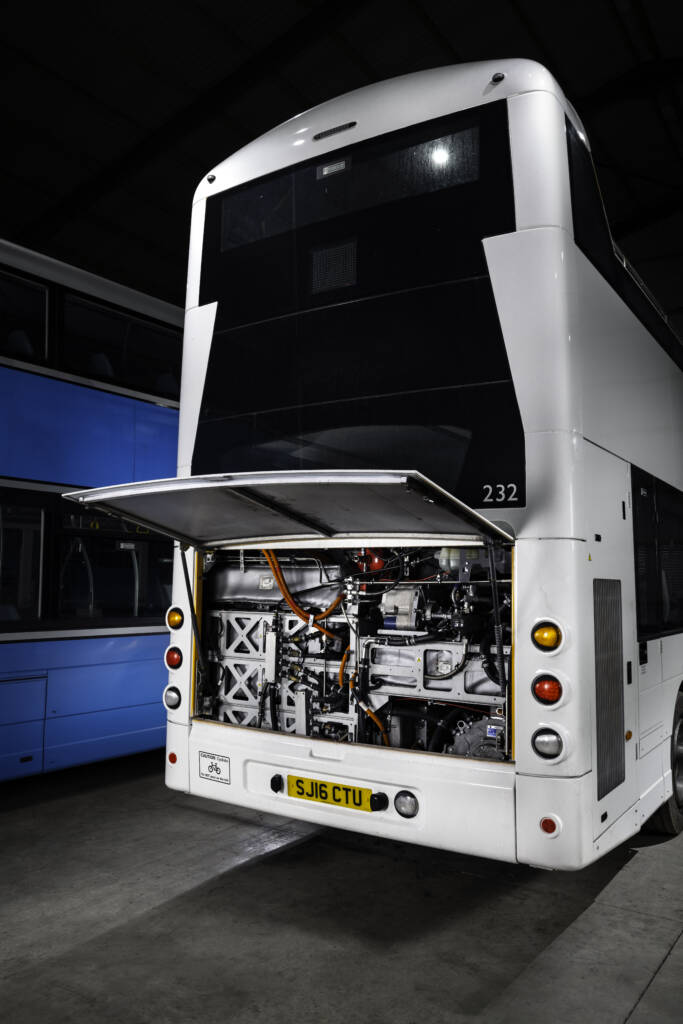
Kleandrive Drivetrain Installed in Rear of Double Deck Bus
UK – In the rapidly evolving landscape of commercial vehicle manufacturing, one company stands out for its innovative approach to decarbonising transport: KleanDrive. Based in Essex, UK, KleanDrive is spearheading the transition to zero-emission vehicles by offering a cost-effective, modular, and scalable solution to repower diesel buses and trucks with electric drivetrains. Founded in 2020 by Joe Tighe, a former financial services veteran with over 30 years of experience, KleanDrive emerged from a desire to make a tangible impact on the environment. This feature article delves into KleanDrive’s mission, operations, market strategy, and the broader context of the UK retrofit market, drawing insights from an exclusive interview with Tighe himself.

Joe Tighe, CEO and Founder of KleanDrive
From Kleanbus to KleanDrive
KleanDrive began life as KleanBus, a start-up focused on electrifying diesel bus fleets. The idea took shape during Tighe’s earlier work on microgrid energy systems, where discussions with fleet operators revealed a glaring gap in the electrification market. While the transition to electric vehicles was accelerating, driven in part by regulatory pressure, the question remained: what should operators do with the large existing stock of diesel buses that would eventually be barred from UK and European roads?
Replacing entire fleets with new electric models came with significant costs. Financial costs, certainly, but also environmental, given the waste generated by scrappage. To borrow the phrase from the investment banking community, it’s all about “timing the market”. Tighe saw an opportunity: instead of scrapping and replacing, why not repower existing vehicles with electric drivetrains? This practical approach became the foundation of KleanBus. In 2024, the company evolved into KleanDrive, an umbrella brand expanding its retrofit technology beyond buses to include trucks and marine vessels.
KleanDrive’s mission is clear: to accelerate the shift to zero-emission transport by retrofitting existing diesel vehicles with state-of-the-art electric drivetrains. As a B Corporation, the company is driven by both environmental and commercial imperatives, aiming to “move the needle” on phasing out combustion engines while delivering cost savings to operators.
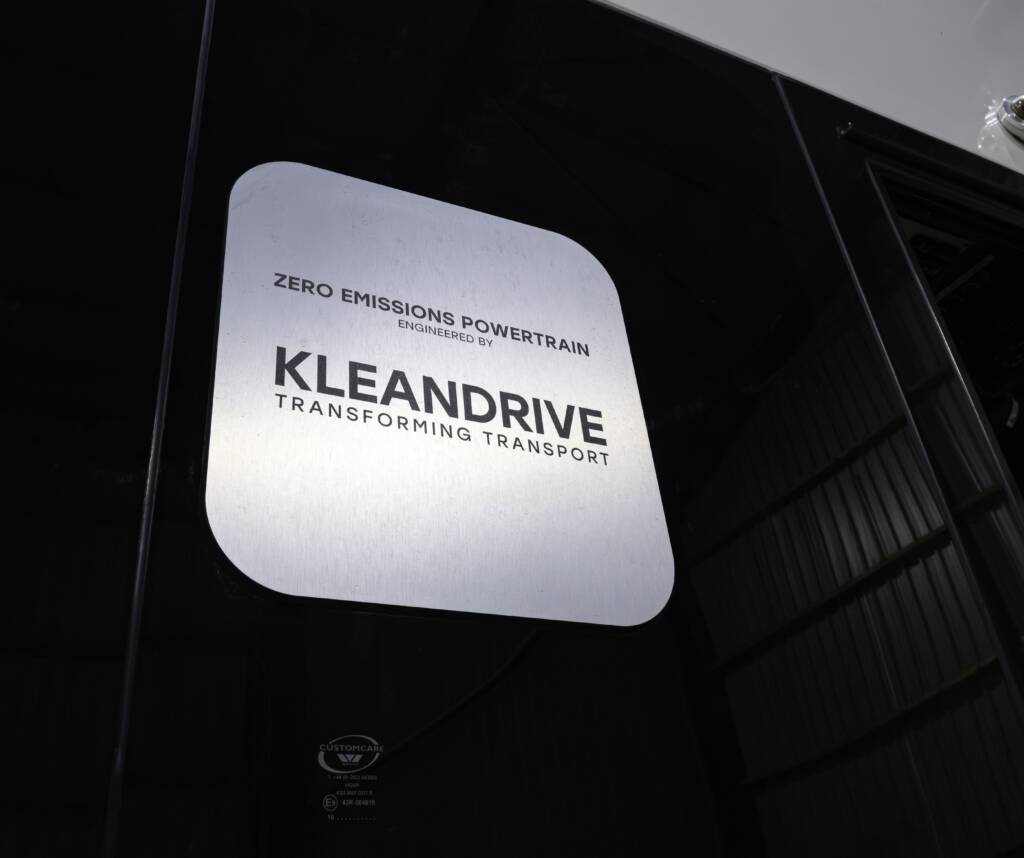
Kleandrive Repowering Branding on Bus
Ownership Structure and Investment
KleanDrive remains a privately held company, with a lean ownership structure designed to maintain independence and flexibility. In late 2024, FirstGroup Plc, through its investment arm FirstGroup Energy Limited, invested GBP 1 million in KleanDrive via a convertible loan note. This investment grants FirstGroup a minority stake of less than 10%, ensuring KleanDrive avoids over-reliance on any single stakeholder. “We’re an industry play,” Tighe explained. “We’d rather have multiple industry players and investment groups own us than one single entity, especially a fleet operator, given the competition in the sector.”
The GBP 1 million investment has been channelled into enhancing KleanDrive’s software, design capabilities, and applications for different vehicle modalities. Currently, the company is raising a GBP 5 million Series A round to further develop its truck and bus retrofit formats and scale production. Tighe emphasised that the funds are primarily allocated to expanding into new vehicle segments, such as the 18-tonne rigid truck market, and refining the modular electric platform to accommodate diverse vehicle types.
The KleanDrive Solution, Technology & USP: A Modular and Scalable Approach
KleanDrive’s unique selling proposition (USP) lies in its “advanced modular electric platform,” a plug-and-play drivetrain that replaces diesel engines and transmissions with electric components. The system integrates high-quality, industry-leading components from Tier 1 suppliers, including CATL’s lithium iron phosphate (LFP) battery packs and Voith electric motors. For buses, the platform features a 352 kWh battery pack, offering an estimated range of 195 miles (313 km) under typical operating conditions. For trucks, such as the Renault D-Series 18-tonne rigid, the system uses a 332 kWh battery pack, maintaining the same range.
The modular design is underpinned by proprietary software that ensures functional safety and compatibility with various vehicle makes and models. “Our software is configurable to adjust to variations in CAN (Controller Area Network) messaging architecture,” Tighe noted, highlighting the platform’s adaptability. This modularity is not just about speed; it’s about scalability. Tighe explained that to handle the potential volume of the retrofit market, the company’s business model is to create and manufacture these modular systems and then ship them to partners for upfitting.
Instead of performing all the engineering on-site, KleanDrive prefabricates, tests, and type-certifies the entire drive system in a controlled environment at its Essex-based manufacturing facility. This innovative process allows for a rapid conversion time of just two weeks once the system has been designed and tested. The conversion process involves a local fleet team stripping out the diesel components and preparing the vehicle for a straightforward upfit of the new electric system, minimising vehicle downtime and ensuring fleet operators can keep their vehicles generating revenue.
Each system is built to maintain the original structural and performance parameters of the host vehicle. According to Tighe, “the bus thinks it’s still running on diesel, thanks to KleanDrive’s CAN bus translation layer and vehicle control unit (VCU), ensuring compatibility with existing electrical systems and safety architecture”. Batteries are configured to fit within the rear engine bay and over wheel arches, preserving balance and handling. Safety, thermal performance, and structural integrity are tested to regulatory standards, including ISO 26262 and BS 7671.
KleanDrive’s conversions are remarkably cost-effective, priced at just 35% – 45% of the cost of a new battery-electric vehicle. While Tighe did not specify the exact baseline price for this comparison, industry estimates suggest new electric double-deck buses cost between GBP 475,000 and GBP 525,000, implying a KleanDrive retrofit costs approximately GBP 190,000 to GBP 210,000 per vehicle. This affordability, combined with significantly lower emissions and operating costs, makes retrofitting an attractive alternative to scrapping diesel fleets or purchasing new electric vehicles.
Compatibility
KleanDrive’s repower solution is not universally compatible with all diesel bus or truck platforms due to variations in chassis design and CAN messaging systems. However, the company’s software-driven approach allows it to adapt to most vehicles of 18 tonnes and above, particularly popular models like the Enviro 400 and Wrightbus StreetDeck. Tighe noted that compatibility is achieved by designing the system around existing chassis attachment points, avoiding structural modifications like drilling.
Aftersales Support and Warranties
For any fleet operator, the worst-case scenario is a vehicle breaking down and the costly downtime that follows. Reliability is everything. One reason DAF Trucks holds such a strong share of the UK HGV market is the strength and reach of its aftersales support network. When something goes wrong, operators want two things: fast access to spare parts and skilled technicians who can get vehicles back on the road.
KleanDrive has adopted a similar approach with a multi-tiered aftersales service. On-site mechanical teams are trained to manage low-voltage and thermal systems, while high-voltage components are serviced directly by KleanDrive or its Tier 1 suppliers. A remote telematics platform provides real-time diagnostics, driver efficiency and battery health alerts, and full fleet performance monitoring.
Warranty coverage is robust. CATL’s LFP battery packs come with an eight- to fifteen-year warranty, depending on duty cycle, while Voith motors are covered for five years. Tighe recounted a recent example of CATL’s responsiveness: “They had two engineers on site within 18 hours. It was fixed the same day, no charge, no hassle. That level of support is crucial for our customers.” Parts availability is assured through KleanDrive’s partnerships with established suppliers, ensuring a resilient supply chain and minimal downtime.
Current Contracts and Market Operations
KleanDrive has achieved notable progress since its first bus retrofit in 2023, converting an Optare Solo diesel bus with a 280 kWh battery and permanent magnet free motor system from Advanced Electric Machines Research Ltd. The company has since secured key contracts, including a 2023 deal with Lothian Buses to repower 18 Volvo B5TLS diesel buses, aiding their zero-emission fleet target by 2035. Additionally, this year, KleanDrive began retrofitting 30 Wrightbus StreetDeck double-decker buses for First Bus, supported by FirstGroup’s GBP 1 million investment, and partnered with Welch Group to retrofit 10 Renault D-Series 18-tonne trucks, marking its entry into the heavy goods vehicle sector.
Currently, KleanDrive focuses on the UK bus market, targeting high-impact models through their high-profile partnership with Alexander Dennis, one of the worlds premier bus manufacturers based in the UK and part of the NFI Group, to provide modular repower systems for the company’s legacy Enviro 400 and Enviro 200 buses. The company is exploring expansion into the US and Europe, with potential US partnerships expected by the end of 2026. According to Tighe, KleanDrive’s strategy emphasises vehicles of 18 tonnes and above, as current battery technology limits viability for smaller commercial vehicles like van
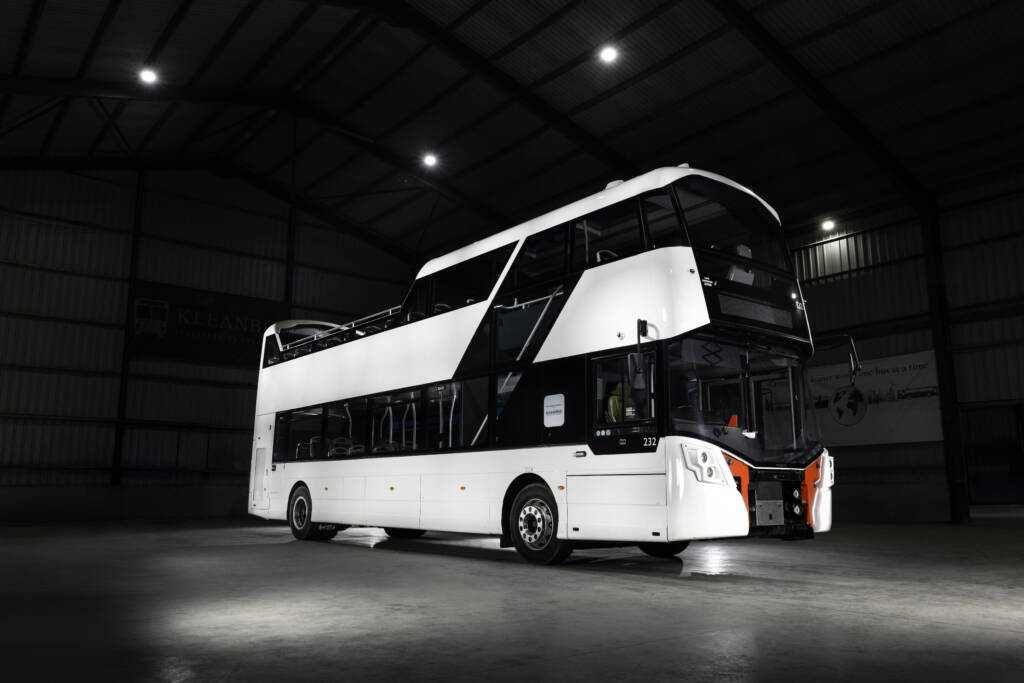
KleanDrive Converted Bus
The UK Retrofit Market: Size and Growth Potential
While precise market size data is scarce, the UK’s bus and HGV sectors are substantial, with approximately 40,000 buses and 500,000 HGVs in operation. With diesel CVs having lifespans of 10 to 20 years and sizeable diesel sales as recently as 2024 (according to SMMT data), the need for retrofitting is evident. Tighe noted that buses, in particular, have an outsized impact on urban air quality due to their localised routes, making them a prime target for electrification.
The retrofit market is expected to grow as regulatory pressures, such as the UK’s 2035 ban on new diesel vehicle sales, intensify. KleanDrive’s ability to extend vehicle lifecycles while reducing total cost of ownership (TCO) positions it well to capture a significant share.
Strategic Priorities and Truck Repowering Timeline
Tighe explained that KleanDrive has set out clear strategic priorities for the next two to three years as it seeks to scale its operations and expand its market presence. Central to this plan is the expansion of manufacturing capacity at its Essex facility to meet growing demand for both bus and truck retrofits. International growth is also on the agenda, with the company aiming to enter the US market by the end of 2026, targeting large-scale repowering projects, while simultaneously exploring partnership opportunities in Europe.
The company’s move into the heavy goods vehicle (HGV) sector is another major focus. Initial efforts are centred on 18-tonne rigid trucks operating in food and beverage logistics, fleets such as Coca-Cola and Budweiser, which offer short duty cycles and high public visibility. This segment has been identified as ideal for current battery capabilities, making it a practical first step before expanding to other truck categories. On the technology side, KleanDrive is enhancing its modular retrofit platform to support a wider range of vehicles and refining its software for greater compatibility.
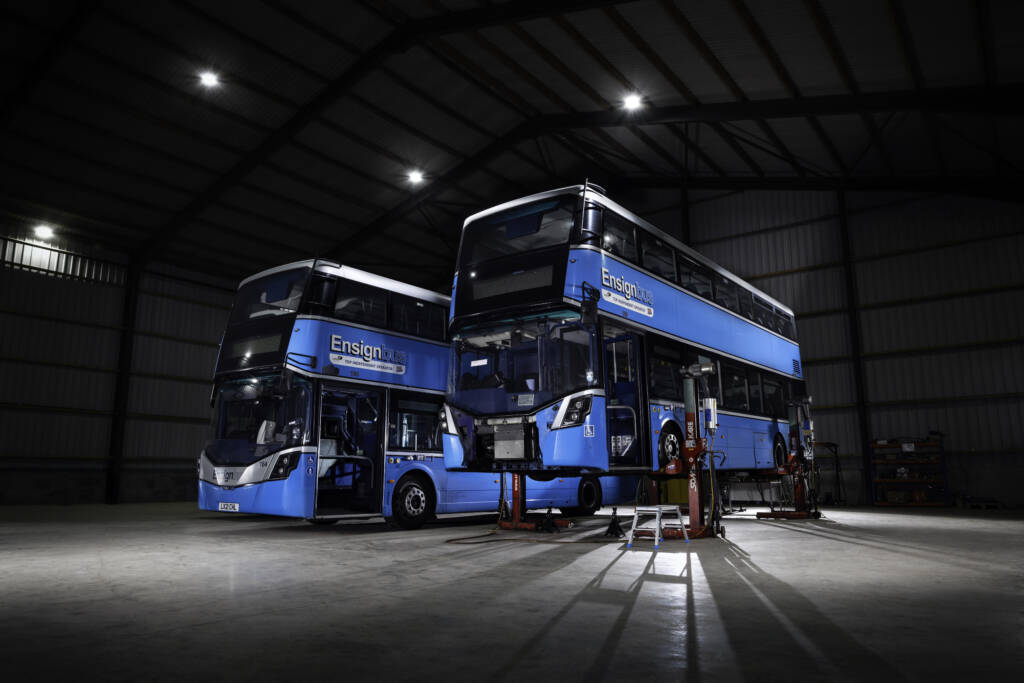
Kleandrive Ensign Buses Undergoing Conversion
Market Trends and the Road Ahead
Over the past five years, customer expectations in the UK have shifted sharply toward sustainability and cost efficiency. Fleet operators are placing greater emphasis on total cost of ownership (TCO), seeking solutions that extend vehicle lifespans while complying with increasingly strict emissions regulations. The expansion of urban low-emission zones and government incentives, such as the GBP 37.8 million awarded for zero-emission buses in 2025, have further accelerated interest in retrofitting. KleanDrive’s ability to deliver rapid, cost-effective conversions positions it squarely in line with these market trends, said Tighe.
Looking forward, the company aims to have a fully type-certified HGV format and complete its First Bus StreetDeck conversions by the end of 2026. With a current team of just 18, KleanDrive plans to double or triple its workforce after Series A funding, enabling it to take on larger “chunky” contracts and scale internationally. While buses remain its UK focus, the next step is the aforementioned truck repowering, starting with rigid HGVs on defined routes where electric drivetrains make operational and economic sense. Longer term, KleanDrive intends to license or supply its drive systems to third-party engineering firms, allowing wider rollout without the cost of major in-house expansion.
There are also hopes of entering the US market, where school bus fleets are a potential goldmine. According to Tighe, “We’re putting the dirtiest diesels in front of our children, the air inside a bus is ten times worse than outside. That’s a problem we can solve.”
Final Thoughts
In conclusion, KleanDrive is not just another company in the electrification space; it is a disruptive force that is changing the narrative around fleet decarbonisation. By offering a fast, cost-effective, and scalable retrofit solution, the company is positioning itself as a leader in a market with immense growth potential. With a clear vision for expansion into new vehicle segments and geographical markets, KleanDrive is set to play a pivotal role in accelerating the global shift away from combustion engines.





